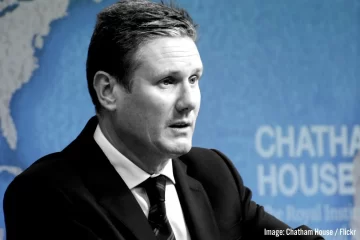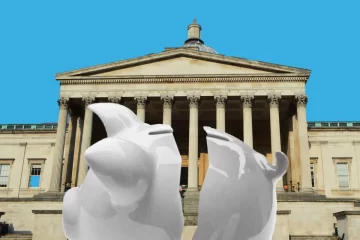It is undeniable that the pandemic has hammered the final nail into the coffin of the previous epoch. But jubilant claims that austerity is a thing of the past have proved premature, as the ruling class begins to wind up its COVID spending spree and resume attacks on workers. The question is, what is the character of this new period, and what will it entail for the working class?
Many on the left are reading the funeral rites for ‘neoliberalism’ – a policy of brutal, unfettered free-market capitalism, and state-spending cuts – and declaring that with its passing, austerity is now over.
As evidence of this, they point on the one hand at massive state interventions in the economy all over the world, with unprecedented fiscal stimulus packages and job support schemes undertaken to prevent total economic collapse and social upheaval during the pandemic.
On the other hand, they cite the apparent new-found enthusiasm of Western governments for industrial policy (i.e. the state attempting to plan and direct capitalism), and protectionism.
In Britain for example, Boris Johnson, Brexit and the Tory conquering of the ‘Red Wall’ by promising massive state investment to ‘level up’ northern constituencies are seen as prime examples of this sea change.
We also have US President Joe Biden’s weakening of anti-Trade Union legislation, and the EU’s relaxation of state aid rules, to allow the EU to protect its industries in competition with China.
If true, such a shift would have important implications for the class struggle. The end of austerity would presumably strengthen the hand of the working class and encourage them to fight back to win some of the extra money that is on the table.
The perspective that neoliberalism and austerity are over is supported by the likes of left economist James Meadway; however he also warns this will not mean an easy ride for the working class:
“Ending austerity on the terms dictated by this Conservative government, or indeed the IMF, will not – this will no doubt come as a shock – herald the dawn of a new era of egalitarian public munificence.” (Novara Media, 20 October 2020)
He adds that “ending austerity will be a process that a Conservative government owns and operates, which will mean both political favouritism, corruption and grift in dishing out any spending increases – we have seen this already around PPE procurement contracts”. (Ibid)
This perspective, i.e. that the Tories and other bourgeois governments are ending austerity, is not unique to Meadway. It is part of the idea, very popular on the left over the past ten years, that austerity was always a political, ideological choice, rather than inevitably arising from capitalism itself.
The ideology informing this choice was, of course, the dreaded neoliberalism. Now that this ideology is seemingly dead, it stands to reason that the madness of austerity should be over, and we can return to business as usual.
Business as usual
But what is business as usual? Did austerity really represent a ‘neoliberal’ inspired break with the norm? Or is it the other way around? Those popping champagne corks to the end of austerity have surely noticed the fact that the £20 uplift to Universal Credit, introduced in Britain during the pandemic, is about to end, which will cost as many as six million families £1,502 a year.
It is telling that, when Work and Pensions minister Baroness Stedman Scott, was asked if the government had bothered to assess the effects of this cut on six million families, she replied that: “We have no obligation to conduct an impact assessment as we’re returning to business as usual”.
 Having opened the spending floodgates during the pandemic, the Tories are beginning to make ordinary workers foot the bill / Image: Number 10, Flickr
Having opened the spending floodgates during the pandemic, the Tories are beginning to make ordinary workers foot the bill / Image: Number 10, Flickr
‘Business as usual’ for capitalism in its period of senile decay means not Keynesianism, nor a renewed period of economic growth and prosperity, but precisely austerity. James Meadway is naive to take Boris Johnson at his word, to put it mildly.
According to the TUC, around one in 20 of those who experienced long COVID lost their job as a result. They will now be on (newly reduced) Universal Credit, something they probably never expected to happen to them. They will soon find out just how callous this Tory government is.
It is interesting to note that the Northern Research Group of Tory MPs (which is composed of new, ‘Red Wall’ Tory MPs, more uncomfortable with austerity than other Tories) urged this cut not to be made. Amongst the public, 51 percent are against the cut to Universal Credit, whilst only 22 percent are in favour. Even 40 percent of Tory voters are against the cut, compared to 33 percent in favour. But the cut is being made. In other words, this government is carrying out decisions in the interests of big business, and not any populist ‘anti-austerity’ programme.
Boris Johnson’s ‘anti-austerity’ government’s most recent budget actually contained an 8.5 percent cut to most departments, in spite of the headlines about ‘levelling up’ the country. Despite pledging that no leaseholders would have to pay for re-cladding their flats as a result of the Grenfell disaster, in the end it turns out they will have to stump up the cash.
Johnson’s government’s education catch up plan consisted of a pathetic £50 per pupil, compared to £2,500 in the Netherlands. Under his regime, one in 10 workers are thought to be facing predatory fire-and-rehire terms. When the German government decided to ‘level up’ East Germany after reunification, it ended up spending around £2tn to do so. That is hundreds of times what the Johnson government has announced for its ‘big government’ levelling up scheme.
This swift return to austerity is not unique to Britain. In the US, a moratorium on evictions has come to an end, which is expected to result in 750,000 families being made homeless. The increase in food stamp payments is also ending this month, and most states have now abolished the $300 weekly top up of unemployment benefit, which means that US benefits will be back to their extremely austere norm.
Three quarters of Euro area governments let their debt holiday policies expire by July. And interest rates are also generally going up in an attempt to rein in inflation and lending.).
If we had entered a new, post-austerity, Keynesian, big government epoch, we would not be seeing a return to all the fiscal policies of the ‘neoliberal era’ of austerity in the aftermath of the most devastating recession in history. But this is exactly what we are witnessing.
National insurance rise
Some have interpreted the tax increase to raise funding for the NHS and social care in Britain as proof that Johnson’s Tories are a profoundly different party to what they were. That is, they have become a ‘tax and spend’ party like ‘Old Labour’.
In fact, it proves the exact opposite. Clearly, increased funding for the NHS reflects the unique circumstances of the pandemic, which has made funding the NHS a political and economic necessity.
And the increase in funding for both health and especially for social care, remains far, far short of what is needed. “Virtually no extra money is going into care, no more than the usual annual bungs it gets to stop it collapsing altogether, the Resolution Foundation’s Torsten Bell tells me… About half of local authority spending on care goes on younger disabled people, and there’s nothing in these plans for them. There will be no new money for professionalising and paying care staff, with 170,000 vacancies expected by the end of the year. It doesn’t come close to replacing the nearly £8bn cut to council care budgets during the austerity decade.” (The Guardian, 9 September 2021)
This extra funding is to be raised, not from progressive income taxation, but from National Insurance contributions, which as we are told, Tories like because the burden falls on workers rather than being solely carried by their big business cronies.
In other words, this is a regressive tax. Instead of taxing the rich, workers are being taxed. It is nothing but a continuation of the austerity policy of making the workers pay for the capitalist crisis.
This also reveals the increase in the power of the Treasury. There have been many reports of a power struggle between Boris Johnson and Chancellor Rishi Sunak, with the latter representing a classic pro-austerity Tory position. The fact that this minimal, and absolutely necessary, funding increase has been provided through an NIC increase proves that austerity is here to stay.
New epoch: same rotten system
Yes, we are in a new epoch. Naturally, this will entail changes in policy by capitalist governments. This does not mean a fundamental ideological shift that will end austerity. The role of ‘neoliberal’ ideology was always greatly exaggerated by reformists who believe that a nicer capitalism is possible and represents the norm. Such an ideology is not the cause of the anti-working class policies that have dominated for the past forty years.
 Austerity is not a ‘choice’, it is an inevitable product of capitalism / Image: Socialist Appeal
Austerity is not a ‘choice’, it is an inevitable product of capitalism / Image: Socialist Appeal
Austerity actually began in Britain before Thatcher. It was the Labour government of James Callaghan that introduced austerity in 1976, completely against its professed ideology and programme, as a result of an economic crisis. The same happened with Mitterand in France.
Similarly, right-wing governments have frequently flouted austerity policies when it suited them. The British state was never shrunk by Thatcher, she just cut social spending. Although the Maastricht treaty imposed austerity onto the EU, the biggest countries like France and Germany always got away with ignoring it (even though they pushed it to begin with).
In the aftermath of the 2008 crisis, ‘fiscal orthodoxy’ was abandoned all round: banks were bailed out and money was printed. All while the same governments enacting these policies imposed massive austerity.
If we try to look at this through an ‘ideological’ lens, it makes no sense. Austerity is supposedly a product of neoliberalism, but this ideology is also supposed to be strictly opposed to massive increases in the money supply and bailouts, both of which occurred to a massive extent after 2008.
What really defines the current moment is the fact that the ruling class is split and has no real plan. The ruling class were forced to open the taps and spend to prevent a social explosion at the start of the pandemic in 2020. One wing anxiously points to the huge amounts of debt that has piled up and which continues to pile up and demands a return to austerity out of fear of ending up in national bankruptcy. Another wing points out that a return to austerity could cause social unrest as anger bubbles over. Both are right.
These divisions have existed for over a decade and they are getting worse. The fact that the German government began to conflict with the IMF over the question of austerity demonstrates this fact. This confusion represents the dead end of capitalism, which is also why there is no coherence in the policies we see.
Yes, the political support for austerity has been destroyed by the past decade. This, combined with the life-support the capitalist economy required in the pandemic, has forced the likes of Johnson and Biden into temporary concessions and big spending.
This political situation made Johnson to pose as anti-austerity, and that is a profoundly important fact which the labour movement must understand – they must take advantage of the mass opposition to austerity, inequality and even capitalism as a whole to fight for socialism, instead of spreading illusions in Johnson.
But the economic need for austerity under capitalism, once workers can be made to go back to work, is stronger than ever, hence the fact that Johnson and other leaders are actually returning to austerity.
The point is that ‘neoliberalism’ did not represent an ideologically driven aberration for capitalism. Actually, it was the post war boom and the reforms that came with it that were abnormal for capitalism. Austerity is simply ‘business as usual’ under this system, and it will only get worse as the realities of the crisis and the pandemic set in. The only way to escape it is by abolishing the capitalist system and replacing it with socialism.
Daniel Morley




0 Comments